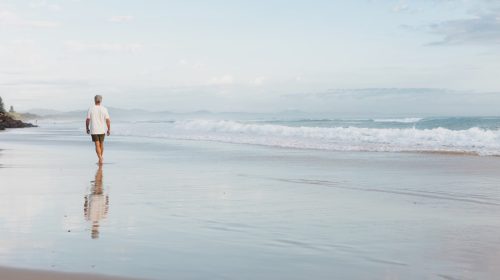Mark Morrissey, talent agent representing artists including Chris Hemsworth and Delta Goodrem says the public may not realise how fragile actors and performers are.
Bernard Fanning of Powderfinger says if success and fame happen quickly to a person and they don’t have a solid network, its easy for an artist to "lose their way".
Psychologist Jane Enter, Co-Clinical Director at Raindrum Private Rehab, has worked for 20 years with high profile celebrities, sports stars and business executives.
Enter says social media has created a new set of higher intensity pressures coming to bear on artists and performers.
High profile performers and entertainment business figures are often surrounded by people afraid to call out bad behaviour.
Mark Pope, 40 year veteran of the Australian music industry, and previous manager of The Angels, Cold Chisel, Jimmy Barnes and INXS, says artists and record companies are now willing to treat mental health issues seriously.
Experts says performers (and high performers) are owed a duty of care to protect their mental health, and preventative programs are key.
JIM Morrison, the legendary American rock and roll poet and provocateur lies buried in Pere Lachaise Cemetery, in Paris. His almost nondescript grave is the cemetery’s most visited, even among the grand tombs of such artistic luminaries as Chopin, Piaf and Oscar Wilde.
One of the infamous 27 club – artists and musicians who died prematurely at the age of twenty seven – Morrison struggled with alcohol and drug addictions that blighted his performances with The Doors. Dogged by controversy and fearing he was at an artistic dead end, Morrison fled America for Paris where at 6am on July 3 he was found dead in his bathtub.
In the decades since, the spectacle of the unravelling artist has become almost folklore; a well trodden path to infamy. The road to fame and success is a perilous one and many arrive bruised, battered but nevertheless beautiful into the spotlight. Unprepared and unsupported, some come off the rails in spectacular fashion.
Breakdowns are big business. There are plenty of page views and click throughs, subscription sales and ad revenue in celebrity tragedy. At the centre of the chaos and tragedy there is a human being. And questions that demand answers.
What is the duty of care owed to artists, singers, actors, both fledgling and established, by those making a living from their endeavours? Do those in the creative industries – the managers, agents, recording companies, publishers and producers – owe an artist a duty of care to protect their mental health? Should they be obliged to offer emerging artists more tangible support as they traverse the path to success and stardom? If so, what should that support look like?
THE THREE STAGES
Psychologist Jane Enter is Co-Clinical Director at Raindrum – a private treatment provider in Byron Bay specialising in one-to-one programs treating addiction and mental health issues, as well as preventative programs to nip issues in the bud before they manifest. Enter has counselled many high profile international and local artists and actors. She sees them as having three distinct phases through their careers.
“At the beginning, as they struggle to gain a foothold in the entertainment business, they have to deal with constant failure,” Enter says. “Not only are they striving to meet their own expectations, but also the ever-changing expectations of the external world. It can be very hard on their confidence and affect how they feel about themselves.
“People who go on to find success are still dealing with expectations, constantly trying to be as good as their last movie, last song or last creative venture. The public can be fickle, they can love you one minute and be indifferent the next. It can be hard to maintain your own sense of self and your own sense of belief.
“At the end of their career artists often wonder if they will ever be that excited about life again, and what their life is going to be like in the future. How do you get to have a normal life when you are used to running on performance adrenalin?
performance adrenalin? “At the end of the day artists are all human beings with the same need for connection, relationships, rest and feedback.”
BEING THE PRODUCT
Mark Morrissey, CEO of Morrissey Management, a Sydney based talent agency representing many of Australia’s best known actors including Chris Hemsworth and Delta Goodrem, has worked with performers at every stage of their careers.
“As a performer, you are the product, so if you are not working or succeeding you can only focus inwards, sometimes unhealthily, on your perceived failures and inadequacies as an artist,”
Morrissey says.
Bernard Fanning was the lead singer-songwriter of one of Australia’s most iconic and successful rock bands, Powderfinger. The band prided themselves on focusing on music alone, but Fanning saw many of his contemporaries struggle with the fame game.
“It becomes dangerous if fame defines you,” Fanning says. “If success and fame happen quickly to a person and they don’t have a network around to keep them grounded then its easy for an artist to lose their way.”
Both Morrissey and Fanning recognise that the inherent, sometimes hidden, sensitivity and fragility of a performer and their willingness to share that with audiences can leave them vulnerable. Morrissey believes the public may not realise how fragile and human actors and performers really are.
“I am constantly astounded by the lack of self-worth some emerging, established and high profile actors see in themselves. They often feel they are faking it and not deserving of the attention despite their obvious talent and popularity.”
he said.
In a career that has so far spanned 45 years Mark Pope has also worked variously as a promoter, tour manager and manager for the Angels, Cold Chisel, Jimmy Barnes and later INXS. He also had stints in the corporate world working with Sony Music and Warner Brothers Music. Like many others who work in the industry alongside the artists, he concedes there were times he was concerned for his own mental health.
“On one hand it was incredibly glamorous, managing an artist like Jimmy Barnes and being ‘on’ pretty much 24/7,” he says. “In rock and roll, every night is Saturday night and every morning is Monday morning. “I had no idea how to handle burning both ends of that candle. I didn’t have the knowledge, self-awareness or skillset to manage. In some ways you had to live that life to know how to live that life. Nothing could prepare you for it.”
he said.
Ed Foster, Head of Label & Publishing at creative agency LUSTRE, believes that in the non-traditional business world of the music industry – where everyone may be struggling as they grow – it can be difficult to define the boundary between being a manager, therapist and friend to an artist.
“There’s no office or defined professional space to walk in to with a respected set of boundaries,”
Mr Foster says.
“Helping our artists maintain their creativity and sustain themselves as human beings is absolutely core to our business,”
Mr Foster says.
“However we are not therapists and neither should we be. Taking on that role would complicate Lustre’s relationship with their artists.
“The thing we need to be able to do is observe, be aware, act with empathy. Then know when and how to effectively intervene and have pathways to manage whatever the situation is via third parties. That’s the best thing we can do to keep the artists wellbeing, their creativity and our respective businesses on track."
SOCIAL MEDIA
Adding to all this is the distraction and all pervasive-ness of social media. After 20 years working with high profile and highly successful people in the arts and entertainment industry, Enter sees a whole new set of higher intensity pressures coming to bear on artists and performers with many feeling they are constantly exposed.
“You can’t slip up these days without it being out there for everyone to see, to go on social media to express their opinion quite strongly about you without knowing you or your situation,”
she said.
“It is even more difficult for women in media and arts with the inordinate and intrusive levels of scrutiny they are subject to in regard to how they look and act.
“That level of intense and sometimes hostile attention can really knock a person, especially if they are feeling vulnerable in the first place. It requires an incredible amount of support and resilience to withstand it.”
Morrissey identified social media and unrelenting coverage in traditional media as contributing to the stress many actors face.
“The pressure on women is so very different. In any number of gossip magazines women are subject to constant microscopic analysis. What’s she wearing, has she put on weight, is she too skinny or too old, is she a good mother… it’s ruthless and unrelenting out there.
“Add to this the pressure of all the fake stories being written about you, not being able to go out in public or to a restaurant without continually being interrupted and the constant very real fear there may be someone just around the corner who may want to do you harm.
“The result is that some artists come to live in a reality slightly bent out of shape due to these kinds of pressures. They may have real trouble coping with this.”
Enter has seen proof that coping with these kinds of stress for long periods of time is beyond most people.
“Think about the life of a singer or performer,” she says. “They travel long distances, their sleep is disturbed and their circadian rhythms get out of kilter. They are given a pill to help them sleep, and soon they may be unable to sleep without the pill. Then they have to perform, so they take something to lift them up. This can easily become a vicious circle. This is always made worse for a performer when they are away from the people who ground them. They may come to feel quite isolated.”
“There are also examples of high profile performers and high profile entertainment business figures being surrounded by people afraid to call out bad behaviour,” Enter says. “People unwilling to give them a reality check because they rely on the performer or industry powerbroker for a job, or they may simply be sycophants happy to be in the company of a celebrity and fame no matter what.”
DUTY OF CARE
So are artists and performers owed a duty of care? Is it advisable for those associated with the business side of the creative industries to invest in some kind of ongoing mental health support and counselling for their performers and artists? If not as an act of human kindness then as a way of protecting their investment in the human assets that their business empires are built upon.
Morrissey believes the industry does owe a duty of care. However, he fears managers and others in the creative industries are generally under qualified to offer mental health support to their clients. He sees the value in performers receiving resilience training and support as they begin their careers. Perhaps at drama school, or even during the course of a long film or television shoot.
He believes this support should come from mental health professionals, not well-meaning but ultimately ill-equipped management teams.
“The entertainment industry does not have the resources or the training to prepare actors for the mental challenges they may face in the industry,” he said. “Many agents and managers have been actors themselves, so understand the challenges, but we can only prepare them as best we can using our own experience.”
“For a manager to carry everything is not realistic,” she says. “Managers may have vast experience in the industry, but they may not know what to look for if someone is under pressure. You need a team around them and you need to have the family involved. People can present well one day, and not so well the next, and it can very much depend on who is seeing it.”
“The entertainment industry does not have the resources or the training to prepare actors for the mental challenges they may face in the industry,” he said. “Many agents and managers have been actors themselves, so understand the challenges, but we can only prepare them as best we can using our own experience.”
Enter sees first-hand the benefits actors and artists gain from therapy and ongoing support to deal with the challenges of a life in the spotlight, where ongoing therapy can help identify and address potential issues before they manifest into a larger, more destructive issue.
Enter says bespoke, private interventional or preventative programs like Raindrum’s – or similar programs around the world – are the gold star standard for high-profile individuals who require a discreet and immersive approach to achieve sustainable change. These highly-personalised programs use a combination ofmedical, psychological, and experiential therapies – such as art or equine therapy – with targeted nutrition, physiotherapy and exercise. They also focus on creating a sustainable environment for the individual to return to, post program. Enter says while private programs are not possible for everyone, there are core, evidence-based strategies underpinning these programs that managers and artists can implement as a starting point to help safeguard their mental health. These strategies are intrinsically connected to nutrition, rest, exercise, sleep and release.
“In the excitement of performing it can be easy to lose touch with how you are feeling physically. It’s important for artists to check in, and ask themselves ‘Have I slept enough and eaten enough. Am I taking care of myself or am I just responding to the demands of the audience and everyone around me?’.”
“Some of the most grounded people I know who have really made it big on the world stage say they are still friends with people they went to school with. A consistency of friendship and an ongoing connection with the people who were there ‘before’ is so important. Those people really ground you, so pay attention to those relationships, don’t lose them.
TIME FOR CHANGE
We often look askance at artists, suspicious that a career in music, performance, film or the visual arts is somehow not a real career at all. We have little sympathy for the well-known, or even the unknown, as they flounder publicly, abusing drugs and alcohol and those around them, seemingly discombobulated by just how rich and famous they are. They can shine so bright that we often have trouble identifying with them as human beings. We think “They’ll be fine. They’re rich and famous, they’re fair game, what have they got to complain about?” But as we evolve and learn more about mental health, it is time we changed our tune, and started recognizing and addressing the unique and often overwhelming strain on mental health that comes with an artistic career.



